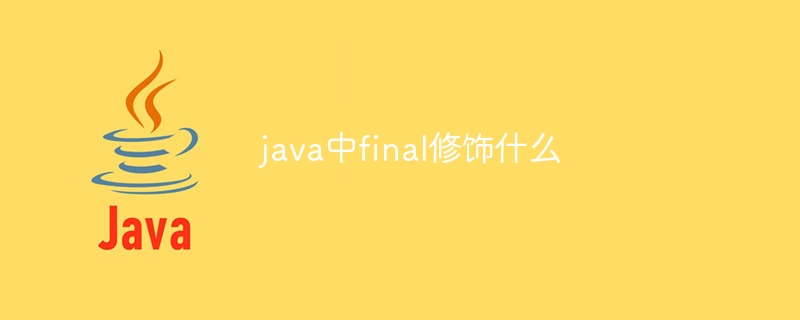What is final modification in java?
The purpose of the final modifier (final): restricts the class from being inherited. Declare immutable constant variables. Prevent methods from being overridden by subclasses.

The role of final modifier in Java
The final modifier in Java is mainly used to restrict objects and members Modifications. It can be applied to the following:
Classes
- Declaring a class final prevents it from being inherited.
Variable
- Declaring a variable as final makes it a constant and its value cannot be changed.
- final variables must be initialized when declared.
Method
- Declaring a method as final prevents it from being overridden by subclasses.
Advantages of the final modifier
- Enforced immutability: Constant variables and immutable objects ensure data integrity.
- Improve performance: The compiler can inline final methods, thereby increasing execution speed.
- Prevent errors: Prevent accidental overwriting or inheritance, reducing the risk of errors.
- Improve security: Final methods cannot be overridden to avoid security vulnerabilities, such as rewriting security-related code.
When to use the final modifier
It is recommended to use the final modifier in the following situations:
- Make sure Objects or variables are immutable: Such as constants or immutable collections.
- Prevent inheritance: Such as sealed classes in design patterns.
- Prevent overwriting: Such as methods for security-critical tasks.
- Improve performance: Such as frequently called methods.
Note:
- Once declared as final, it cannot be modified.
- final variables cannot be reassigned.
- Final methods cannot be overridden by subclasses.
The above is the detailed content of What is final modification in java?. For more information, please follow other related articles on the PHP Chinese website!

Hot AI Tools

Undresser.AI Undress
AI-powered app for creating realistic nude photos

AI Clothes Remover
Online AI tool for removing clothes from photos.

Undress AI Tool
Undress images for free

Clothoff.io
AI clothes remover

AI Hentai Generator
Generate AI Hentai for free.

Hot Article

Hot Tools

Notepad++7.3.1
Easy-to-use and free code editor

SublimeText3 Chinese version
Chinese version, very easy to use

Zend Studio 13.0.1
Powerful PHP integrated development environment

Dreamweaver CS6
Visual web development tools

SublimeText3 Mac version
God-level code editing software (SublimeText3)

Hot Topics
 1377
1377
 52
52
 How does Java's classloading mechanism work, including different classloaders and their delegation models?
Mar 17, 2025 pm 05:35 PM
How does Java's classloading mechanism work, including different classloaders and their delegation models?
Mar 17, 2025 pm 05:35 PM
Java's classloading involves loading, linking, and initializing classes using a hierarchical system with Bootstrap, Extension, and Application classloaders. The parent delegation model ensures core classes are loaded first, affecting custom class loa
 How do I implement multi-level caching in Java applications using libraries like Caffeine or Guava Cache?
Mar 17, 2025 pm 05:44 PM
How do I implement multi-level caching in Java applications using libraries like Caffeine or Guava Cache?
Mar 17, 2025 pm 05:44 PM
The article discusses implementing multi-level caching in Java using Caffeine and Guava Cache to enhance application performance. It covers setup, integration, and performance benefits, along with configuration and eviction policy management best pra
 How can I use JPA (Java Persistence API) for object-relational mapping with advanced features like caching and lazy loading?
Mar 17, 2025 pm 05:43 PM
How can I use JPA (Java Persistence API) for object-relational mapping with advanced features like caching and lazy loading?
Mar 17, 2025 pm 05:43 PM
The article discusses using JPA for object-relational mapping with advanced features like caching and lazy loading. It covers setup, entity mapping, and best practices for optimizing performance while highlighting potential pitfalls.[159 characters]
 How do I use Maven or Gradle for advanced Java project management, build automation, and dependency resolution?
Mar 17, 2025 pm 05:46 PM
How do I use Maven or Gradle for advanced Java project management, build automation, and dependency resolution?
Mar 17, 2025 pm 05:46 PM
The article discusses using Maven and Gradle for Java project management, build automation, and dependency resolution, comparing their approaches and optimization strategies.
 How do I create and use custom Java libraries (JAR files) with proper versioning and dependency management?
Mar 17, 2025 pm 05:45 PM
How do I create and use custom Java libraries (JAR files) with proper versioning and dependency management?
Mar 17, 2025 pm 05:45 PM
The article discusses creating and using custom Java libraries (JAR files) with proper versioning and dependency management, using tools like Maven and Gradle.




